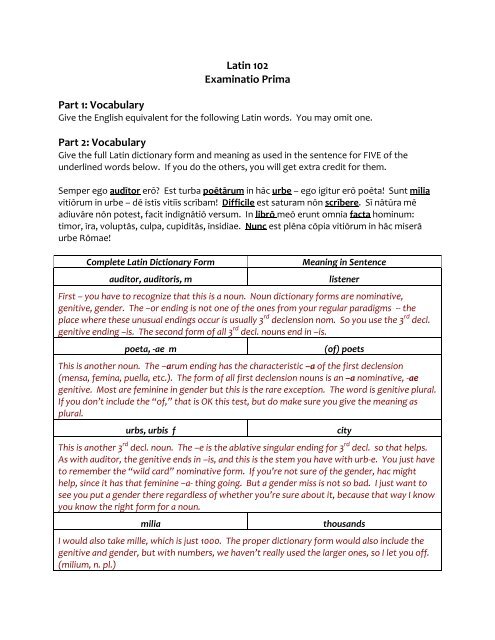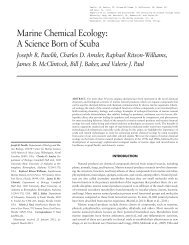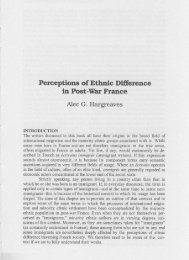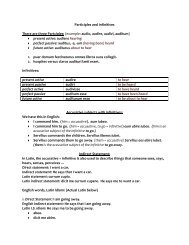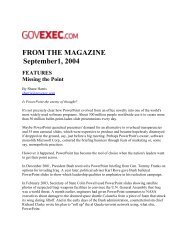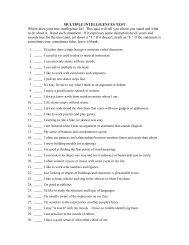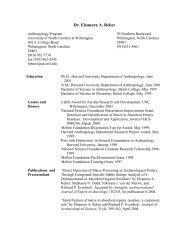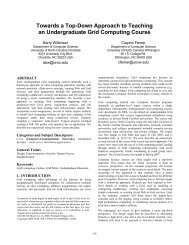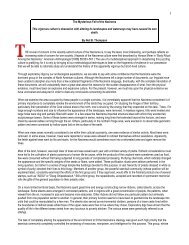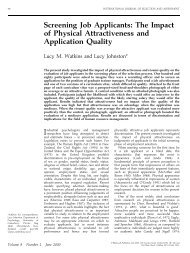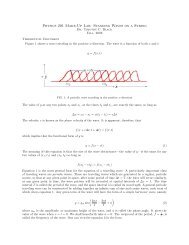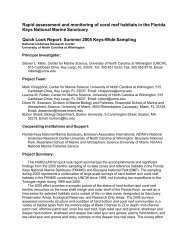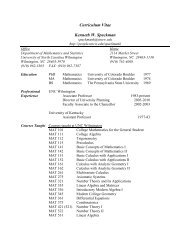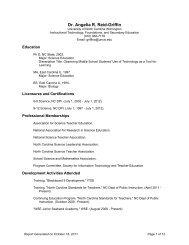Latin 102 Examinatio Prima Part 1: Vocabulary Part 2: Vocabulary
Latin 102 Examinatio Prima Part 1: Vocabulary Part 2: Vocabulary
Latin 102 Examinatio Prima Part 1: Vocabulary Part 2: Vocabulary
Create successful ePaper yourself
Turn your PDF publications into a flip-book with our unique Google optimized e-Paper software.
<strong>Latin</strong> <strong>102</strong><br />
<strong>Examinatio</strong> <strong>Prima</strong><br />
<strong>Part</strong> 1: <strong>Vocabulary</strong><br />
Give the English equivalent for the following <strong>Latin</strong> words. You may omit one.<br />
<strong>Part</strong> 2: <strong>Vocabulary</strong><br />
Give the full <strong>Latin</strong> dictionary form and meaning as used in the sentence for FIVE of the<br />
underlined words below. If you do the others, you will get extra credit for them.<br />
Semper ego audītor erō? Est turba poētārum in hāc urbe – ego igitur erō poēta! Sunt mīlia<br />
vitiōrum in urbe – dē istīs vitiīs scrībam! Difficile est saturam nōn scrībere. Sī nātūra mē<br />
adiuvāre nōn potest, facit indignātiō versum. In librō meō erunt omnia facta hominum:<br />
timor, īra, voluptās, culpa, cupiditās, īnsidiae. Nunc est plēna cōpia vitiōrum in hāc miserā<br />
urbe Rōmae!<br />
Complete <strong>Latin</strong> Dictionary Form Meaning in Sentence<br />
auditor, auditoris, m listener<br />
First – you have to recognize that this is a noun. Noun dictionary forms are nominative,<br />
genitive, gender. The –or ending is not one of the ones from your regular paradigms -- the<br />
place where these unusual endings occur is usually 3 rd declension nom. So you use the 3 rd decl.<br />
genitive ending –is. The second form of all 3 rd decl. nouns end in –is.<br />
poeta, -ae m (of) poets<br />
This is another noun. The –arum ending has the characteristic –a of the first declension<br />
(mensa, femina, puella, etc.). The form of all first declension nouns is an –a nominative, -ae<br />
genitive. Most are feminine in gender but this is the rare exception. The word is genitive plural.<br />
If you don’t include the “of,” that is OK this test, but do make sure you give the meaning as<br />
plural.<br />
urbs, urbis f city<br />
This is another 3 rd decl. noun. The –e is the ablative singular ending for 3 rd decl. so that helps.<br />
As with auditor, the genitive ends in –is, and this is the stem you have with urb-e. You just have<br />
to remember the “wild card” nominative form. If you’re not sure of the gender, hac might<br />
help, since it has that feminine –a- thing going. But a gender miss is not so bad. I just want to<br />
see you put a gender there regardless of whether you’re sure about it, because that way I know<br />
you know the right form for a noun.<br />
milia thousands<br />
I would also take mille, which is just 1000. The proper dictionary form would also include the<br />
genitive and gender, but with numbers, we haven’t really used the larger ones, so I let you off.<br />
(milium, n. pl.)
difficilis, difficile difficult<br />
This is an adjective, giving a description rather than representing an object or idea. In the third<br />
declension, most adjectives have a m/f form, and a neuter form. The –is is m/f and comes first.<br />
There is no gender because adjectives take on the gender of the word they describe.<br />
scribo, scribere, scripsi, scriptum to write<br />
The verb dictionary form has 4 parts (rarely 3). The translation should reflect the person,<br />
number , and tense, or if the verb is infinitive or imperative, that meaning. Here it is infinitive –<br />
to write.<br />
liber, libri, m book<br />
in usually takes ablative, so libro is ablative, the –o from the second declension. Is it librus, -i m<br />
or liber, libri m or librum, libri n? These are the choices and hopefully the right one will ring a<br />
bell. It’s singular in the reading, so “book”<br />
factum, -i n deeds<br />
This is a neuter word, so the –a is plural. Here it is the subject: all the deeds will be … You have<br />
to ask yourself is it facta, -ae f or factum, -i n? The verb is oplural, so that might help you<br />
decide for factum.<br />
nunc now<br />
At last! Only nouns, adjectives, and verbs have complex dictionary forms. This isn’t one. You<br />
only have to put it down and remember what it means.<br />
<strong>Part</strong> 3: Gender, Number, Case<br />
For each of the underlined words, give the gender, number and case. (I will omit one or use<br />
it for extra credit.)<br />
Semper ego audītor erō? Est turba poētārum in hāc urbe – ego igitur erō poēta! Sunt mīlia<br />
vitiōrum in urbe – dē istīs vitiīs scrībam! Difficile est saturam nōn scrībere. Sī nātūra mē<br />
adiuvāre nōn potest, facit indignātiō versum. In librō meō erunt omnia facta hominum:<br />
timor, īra, voluptās, culpa, cupiditās, īnsidiae. Nunc est plēna cōpia vitiōrum in hāc miserā<br />
urbe Rōmae!<br />
Word Gender Number Case<br />
audītor m. s . nom.<br />
Verb sum does not have a direct object – auditor is equivalent to “I” the subject.<br />
turba f. s . nom.<br />
turba is the first word, the verb is singluar, so the –a is fem. sing. instead of neuter plural. This<br />
makes it nominative i.e. the subject of the sentence.<br />
poētārum m pl. gen.
-arum is a genitive plural ending – enough said. poeta, though, is one of the rare 1 st declension<br />
masculine words.<br />
hāc f. s . abl.<br />
This is an adjective (demonstrative adjective, to be specific) so it agrees with something. urbe –<br />
the –e is usually an ablative ending, and it follows in, which takes the ablative. –a is a typical<br />
vowel for feminine adjectives, so go with that.<br />
vitiōrum n. pl. gen.<br />
-orum is genitive plural. Is it masculine or neuter? You just have to know it’s vitium not vitius.<br />
saturam f. s . acc.<br />
-am is accusative singular 1 st declension, i.e. almost always feminine.<br />
nātūra f. s . nom.<br />
natura, -ae f or naturum, naturi neuter. The first; feminine words are more common than<br />
neuter anyway.<br />
mē m. f. s . acc.<br />
In this occurrence it’s masculine, but me can be either gender. “Me,” by definition singular. no<br />
reason for it to be ablative so it is accusative.<br />
librō m. s . abl.<br />
object of in, -o is a common ablative ending, and you probably remember that “book” is<br />
masculine.<br />
facta n. pl. nom.<br />
is it facta, –ae f or factum, -i n? If you remember the dictionary form, you will realize that it is<br />
neuter plural.<br />
hominum m. f. pl. gen.<br />
The infamous –um genitive plural ending for third declension words.<br />
īnsidiae f. pl. nom.<br />
from the –ae form, you know it’s first declension, but which occurrence of –ae? Is there any<br />
reason for it to be dative or ablative? No? Is the verb plural which likely makes it the subject?<br />
Yes.<br />
<strong>Part</strong> 4: Paradigms<br />
Give the masculine/feminine forms of fortis, forte, brave.<br />
Case Singular Plural<br />
nom. fortis fortes<br />
gen. fortis fortium<br />
dat. forti fortibus
acc. fortem fortes<br />
abl. forti fortibus<br />
Adjectives have the –ium endings in genitive plural. With 3 rd declension words, whether nouns<br />
or adjectives, you always drop an –is to get the stem.
Give the neuter forms of qui, quae, quod.<br />
Case Singular Plural<br />
nom. quod quae<br />
gen. cuius quorum<br />
dat. cui quibus<br />
acc. quod quae<br />
abl. quibus quibus<br />
You just have to know them. Remember that neuters are always the same nominative and<br />
accusative.<br />
Give the future tense and meanings of the verb currō, -ere, cucurrī, cursum, I run<br />
Person/ # Future Tense Meaning<br />
I curram I will run<br />
you s. curres you will run<br />
s/he, it curret s/he, it will run<br />
we curremus we will run<br />
you pl. curretis you will run<br />
they current they will run<br />
Remember that 3 rd , 3 rd -io and 4 th conjugation verbs have their futures with a vowel change<br />
ratehr than –bo, bis, bit etc. (used by 1 st and 2 nd conj. verbs)
<strong>Part</strong> 5: Forms<br />
Fill out the chart with the appropriate present, imperfect, or future verbs. NOTE: You do<br />
NOT need to put the definition as I assume you know how to translate present, imperfect,<br />
and future tenses.<br />
Present Imperfect Future<br />
navigant nāvigābant<br />
they sailed<br />
navigabunt<br />
dēlēs<br />
you destroy<br />
delebas delebitis<br />
cupimus cupiebamus cupiēmus<br />
we will desire<br />
recitat<br />
he recites<br />
recitabat recitabis<br />
incipit incipiēbat<br />
incipiet<br />
he began<br />
exspecto exspectabam exspectābō<br />
I will await<br />
Give the genitive singular and plural, of the following words:<br />
Word Genitive Singular Genitive Plural<br />
poeta, -ae m poetae poetarum<br />
tempestās,<br />
tempestātis f tempestatis tempestatum<br />
iūs, iūris n iuris iurum<br />
stilus, -ī m stili stilorum<br />
Give the accusative singular and plural of the following words:<br />
Word Accusative Singular Accusative Plural<br />
animal, animālis n animal animalia<br />
clementia, -ae f clementiam clementias<br />
mens, mentis f mentem mentes<br />
annus, -ī m annum annos<br />
With third declension, remember that you drop an –is to get the stem.
<strong>Part</strong> 7: Translation<br />
Juvenal describes how the amount of vice and crime in Rome makes him decide to become a<br />
satyric poet.<br />
1. Semper ego audītor erō? Will I always be a listener?<br />
2. Est turba poētārum in hāc urbe – ego igitur erō poēta! There is a crowd of poets in this<br />
city – I will also be a poet!<br />
3. Sunt mīlia vitiōrum in urbe – dē istīs vitiīs scrībam! There are thousands of crimes in the<br />
city – I will write about those crimes!<br />
4. Difficile est saturam nōn scrībere. It is hard not to write satire.<br />
5. Sī nātūra mē adiuvāre nōn potest, facit indignātiō versum. If nature will nto help me,<br />
indignation will make the verses.<br />
6. In librō meō erunt omnia facta hominum: timor, īra, voluptās, culpa, cupiditās, īnsidiae.<br />
In my book will be all the deeds of men [people]: fear, rage, indulgence, fault, greed,<br />
treachery.<br />
7. Nunc est plēna cōpia vitiōrum in hāc miserā urbe Rōmae! Now there is a full abundance<br />
of crimes in this city of Rome.


